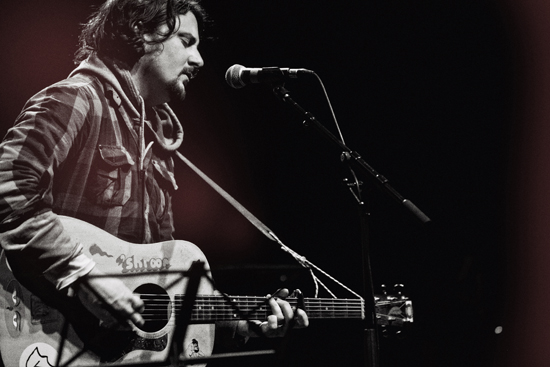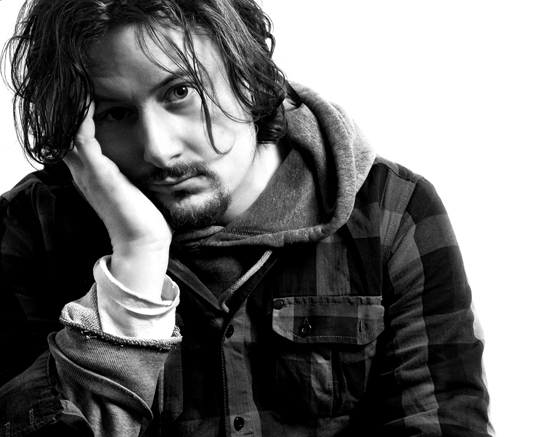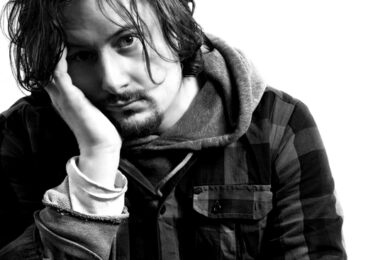‘Jesus said to the man with the withered hand, "Come and stand in front of everyone"’
New Testament, The Gospel of Mark
‘Lord, won’t you deliver me from the wave machine and the transparent bikini?’
Withered Hand, ‘Love in the time of Ecstasy’
He is standing in front of us now, the thrash-folk saviour they call Withered Hand, and he is singing ‘Religious Songs’. We’re singing along, passing round BYOB red wine because it’s an all-ages gig in a disused church, and that’s what our hero is all about. Offstage, he is known as Dan Willson – Edinburgh DIY-pop idol, Fence Collective luminary, ally of grassroots superheroes Meursault, Rob St John and eagleowl, creator of 2009’s ace debut album Good News, and an incendiary bard whose words are enlightening, heart-breaking and wry.
Later, we meet in an Edinburgh alehouse, and thereafter we picnic on the Meadows, and we talk of his upbringing as a (now lapsed) Jehovah’s Witness, his nascent art-rock outfit, Peanut ("People thought it was a stupid joke"), and his formative spell in an all-girls school ("It was the worst thing I ever did").
He is too modest to namecheck his fans, but they are myriad and notable. "He records like Billy Childish and mixes like the Blue Nile", proclaims Darren Hayman, who recorded Willson’s recent Chart Ruse EP and forthcoming Inbetweens 10". "He’s the UK’s best lyricist", decrees Fence boss and recent touring comrade King Creosote.
We speak about the genesis of Withered Hand, leaning on our arms, on the grass, in the sun.
"Won’t you wear your sacrilegious undergarments?"
Withered Hand – ‘Cornflake’
Is ‘Cornflake’ really the first song you wrote as Withered Hand? In a matter of bars it established you as the greatest pop chronicler of Seventh-day Adventism since Prince.
Dan Willson: Yeah, that was the first one. I wanted to set it out as a kind of manifesto. There’s lots of biographical stuff in there – there’s lots of that in all of my songs.
The outsider notion is pretty clichéd in rock but I wondered if you felt physically or psychologically distanced from your peers as a child, because of your Jehovah’s Witness upbringing, and if this has affected your outlook and art?
DW: Christmas and birthdays were obviously the most glaring examples – we didn’t celebrate, and I had to sit out of religious services at school. But beyond that, there’s the feeling that the world, and all life, is incredibly temporary in this system and that we’re now living in the actual end days. There’s the belief that demons and angels are real and there are many, many other things which mainstream Western thinking might pour scorn upon. That gave my fledgling artistic temperament a lot to think about. It still does.
When you’re raised to believe that the world is going to end very soon, you read everything as a sign. I can’t seem to erase that from my mind, and it seeps into my songs I guess. Faith still fascinates me – I’m still looking out for it all around.
I always think of ‘Love in the Time of Ecstasy’ as a kind of melancholic, existential take on ‘Club Tropicana’ – "Lord, won’t you deliver me from the wave machine and the transparent bikini."
DW: I like that reading of the song. It’s really a meditation on growing up in a small, unremarkable, town [Bishop’s Stortford, Hertfordshire] and then finding yourself a long way away – in many senses – and lovelorn. I spent a few months in Athens in my early twenties. I was supposed to be studying at the School of Art but amid the confusion of the first flush of Erasmus European Exchange Schemes, my friend and I somehow slipped through the net, never showed for any classes, and spent the entire time wandering about, kicking oranges around in parks, drawing, drinking beer and reading. We had a hotel provided for us in the most horrible part of Athens and it was a real coming of age experience, set against the backdrop of a major relationship breakdown.
"I roll my eyes up to these dirty skies and count the days ’til I’ll be leaving."
Sometimes I look around and wonder if much of this world is worth saving, and I always fight myself to say, ‘Yes it is’.
Your signature anthem, ‘Religious Songs’, takes its refrain, "Knocking on Kevin’s front door", from a time you were door-stepping as a Jehovah’s Witness. Is it strange having those words, and that childhood memory, sung at you verbatim by audiences?
DW: Yeah, it was weird at first, everyone singing those words back to me. I never imagined that would happen. But Alun my drummer said it would. And, as usual, he was right.
(Among other things, ‘Religious Songs’ touches on Death Metal, ill-fitting suits and happiness (or the lack thereof). It also contains the immortal line, "I beat myself off when I sleep on your futon".)
Let’s set the record straight on that much-conjectured sofa-bed / autoeroticism interface. Is that borne of a literal or metaphorical scenario?
DW: Both.
Good to know. Something for us all to think about there.
[Silence]
Can you please tell me about the time that you spent at a girls’ school in Hertforshire?
DW: I spent two years at a sixth form college which had previously been an all-girls’ school. The ratio was 10 boys to 1000 girls. It was the worst thing I ever did, as far as developing a healthy impression of the opposite sex. Instead of the teenage sexual awakening I had feverishly envisaged, it made me quite withdrawn and shy. I used to often leave school between lessons, as my father’s house was nearby, and hide in the garage painting.
You went to Art College after that, and started out as a visual artist, is that right?
DW: Yeah, I studied at Art College in London. When I was a student I had a really frugal lifestyle which was good, because it sat well with my aesthetics, right? I was reading all these books on hunger and stuff – all the books you really have to subscribe to if you’re going to exist with not much money. If you’re going to have integrity. [laughs]
Then I moved to Edinburgh with my girlfriend, who’s now my wife, in 1996, and I set up a studio in my kitchen, to do my drawing and make prints and stuff. The neighbour upstairs had a leak, so bits of the ceiling kept falling onto my work. But I started to feel like that kind of art was a strange, rarefied world to move in. I hated the idea of making something that you thought was for everyone, and then putting it into a white box gallery, and not being there to see if anyone got it or not. That medium can result in something completely different to what your intentions are. And I didn’t really like that idea of the patronage system. There were many things about it that made me think it wasn’t for me. I started thinking that maybe music was the way.
You started a band as a reaction to the limitations of visual art?
WH: Yeah, I started making really fast surf-punk with my friend Neil Sylvester – he’s actually just joined me again on bass. We called ourselves The Squits, and that became short-lived art-rock band Peanut. We wanted to see what happened when you make a noisy, confrontational thing and people are either into it or not. We had this girl playing the drums and she’d never played the drums before. She was a violinist. She could only play one beat. That was fine, but it soon became a limitation. There was one really good thing that she did though – she coerced us into singing. Or rather, shouting.
That was the first time I’d sung since I got chucked out of the choir as a kid. And eventually I got used to shouting on stage in shitty clubs. I didn’t ever think of it as anything other than art though.

It was just a means of expression?
DW: Yeah, exactly. I think a lot of the time people thought it was just a stupid joke. But I started writing lyrics and shouting them, and that was good for me, because I felt like I was able to say stuff.
(Willson recently revisited a Peanut song, ‘My Struggle’, on this year’s Fence-released Chart Ruse EP, which suggests that some of his earliest lyrics feature such romantic lines as, "I like sniffing herbal teabags / I love the way the skin on your face sags / under the weight of your make-up".)
You hadn’t written lyrics at all before Peanut?
DW: Well, you know, teenage poetry, the usual. And I did write stuff on my drawings, actually. I kind of scrawled words and phrases on my graphic art prints. I guess I was trying to elevate comic art or something – words and pictures meeting … I was a bit highfalutin. [laughs]
Then I started to realise that simplicity is the Holy Grail. My wife gave me an acoustic guitar for my thirtieth birthday. That was a massive moment. It stripped away lots of baggage. It was like drawing with only one pen.
That’s when I started what I would call properly singing. I’d play songs in the house on my acoustic guitar, because it wasn’t disturbing anyone. I didn’t think about playing the songs out, but Bart from [Edinburgh slowcore heart-throbs] eagleowl was like, ‘We’re doing this thing in a café called Foodstock, you should do something at it.’ And I wasn’t sure, but the whole thing with that shouty band was that it was pushing me into an uncomfortable place as quite a shy person, and this I saw as pushing myself in a different way, so I played three songs, all shaky.
One of the things that really struck me about the whole communal thing of playing in the café was that it was nothing like the white cube; the one-way traffic of the visual art world. That’s one of the things that give music a really emotional charge for me: it’s the opposite of visual art. It takes what I think my art is, and what it means, to a different place.
(Since then, Willson’s art has taken him on tour in Europe and the US, where he struck up a deal with indie label Absolutely Kosher. It was sadly short-lived due to the label going on hiatus, but it does have one legacy in this wonderful film for ‘No Cigarettes’, made by LA film-maker Matt Amato, who’s directed clips for Bon Iver, Beach House and Lucky Dragons.)
Matt was visiting Edinburgh for a wedding, so we cut a deal which meant he came and stayed in my house, with my family. The idea was he just filmed during his stay, like a diary of his trip, on a tiny toy camera from Japan. We’d often totally forget he was filming – he just became this very charming houseguest. He gave the camera to my kids on some days, so they actually filmed some of it. It’s a very personal film, like reading a songbook or diary. I tried to show him things I love about the city and we spent a lot of time talking about life’s journey and each other’s experiences. I miss him.
The Inbetweens EP, due in September, will be Willson’s last release until he works out "how to make a second album." So his year in songs has opened with the crashing shout-pop of ‘Heart Heart’, and will culminate with long-term live favourite, ‘It’s A Wonderful Lie’. In the gospel according to Withered Hand, both of these indie psalms are about "love and not being able to match people’s expectations of you".
This is ironic, given that Willson continues to exceed our beliefs, as he blazes a trail to prove that there are many joys to DIY; that life is worth living, whatever the skies; that pop is the greatest redeemer of all; that groove is in the heart (heart).
Withered Hand plays Edinburgh Queens Hall with Darren Hayman, ballboy and Josie Long on Saturday August 4, then tours the UK, dates here. The Inbetweens EP released in September.




